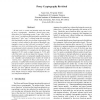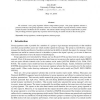181 search results - page 11 / 37 » Anonymous Proxy Signatures |
NDSS
2003
IEEE
14 years 20 days ago
2003
IEEE
In this work we revisit and formally study the notion of proxy cryptography. Intuitively, various proxy functions allow two cooperating parties F (the “FBI”) and P (the “pro...
ASIACRYPT
2007
Springer
14 years 1 months ago
2007
Springer
We construct a new group signature scheme using bilinear groups. The group signature scheme is practical, both keys and group signatures consist of a constant number of group elem...
ASIACRYPT
2001
Springer
13 years 12 months ago
2001
Springer
A fair blind signature scheme allows the trustee to revoke blindness so that it provides authenticity and anonymity to honest users while preventing malicious users from abusing th...
CTRSA
2005
Springer
14 years 29 days ago
2005
Springer
Undeniable signatures were introduced in 1989 by Chaum and van Antwerpen to limit the self-authenticating property of digital signatures. An extended concept – the convertible un...
IEEEARES
2007
IEEE
14 years 1 months ago
2007
IEEE
Voter anonymity, also known as unlinkability, is the primary requirement to satisfy privacy in e-voting protocols. Up until now, e-voting protocols have tried to make communicatio...


